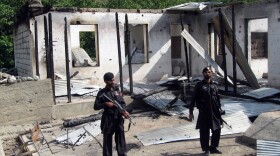
Philip Reeves
Philip Reeves is an award-winning international correspondent covering South America. Previously, he served as NPR's correspondent covering Pakistan, Afghanistan, and India.
Reeves has spent two and a half decades working as a journalist overseas, reporting from a wide range of places including the former Soviet Union, the Middle East, and Asia.
He is a member of the NPR team that won highly prestigious Alfred I. duPont–Columbia University and George Foster Peabody awards for coverage of the conflict in Iraq. Reeves has been honored several times by the South Asian Journalists' Association.
Reeves covered South Asia for more than 10 years. He has traveled widely in Pakistan and India, taking NPR listeners on voyages along the Ganges River and the ancient Grand Trunk Road.
Reeves joined NPR in 2004 after 17 years as an international correspondent for the British daily newspaper The Independent. During the early stages of his career, he worked for BBC radio and television after training on the Bath Chronicle newspaper in western Britain.
Over the years, Reeves has covered a wide range of stories, including Boris Yeltsin's erratic presidency, the economic rise of India, the rise and fall of Pakistan's General Pervez Musharraf, and conflicts in Gaza and the West Bank, Chechnya, Iraq, Afghanistan and Sri Lanka.
Reeves holds a degree in English literature from Cambridge University. His family originates from Christchurch, New Zealand.
-
On Tuesday, 115 "cardinal electors" will be locked inside the Vatican to begin the secretive process of selecting the new leader of the world's 1.2 billion Catholics. It's one of the more spectacular and intriguing theatrical dramas on the planet.
-
Pope Benedict XVI leaves office this week, the second pope to resign voluntarily. The first was Celestine V, a hermit who quit in 1294, after a brief and disastrous stint. Some scholars say Dante damned Celestine as a coward in his Inferno. Yet his example, legally and spiritually, played a major role in Benedict's departure.
-
Food retailers are poring over piles of beef-based foods for hints of horse contamination. Aside from health concerns, why do Brits have so much beef with horsemeat?
-
One of the world's most basic cooking ingredients could be the key to protecting some of Europe's most stunning buildings. The limestone used in England's 800-year-old York Minster is particularly vulnerable to pollution. The oleic acid in olive oil, British researchers say, may provide the protective coating needed to prevent further decay.
-
The former Soviet citizens who flooded into Israel two decades ago have changed the country's demographics, helped strengthen the economy and played a significant role in the general rightward shift of the Israeli electorate.
-
In many countries, the very young have zero interest in politics. After decades of conflict, however, Gaza is an intensely political place and its young people were out in force to give Hamas leader Khaled Meshaal a hero's welcome �� even though many are still suffering the effects of the recent eight-day missile offensive.
-
Palestinians are reveling Friday, following the U.N. General Assembly's elevation of their status from nonmember "entity" to nonmember "state." But what that change means depends on whom you ask.
-
Palestinian leader Mahmoud Abbas appears at the U.N. General Assembly on Thursday to request an upgrade in the Palestinians' status at the world body.
-
Pakistan is growing increasingly worried about the threat of civil war in Afghanistan when U.S. and other Western forces withdraw in 2014. In recent decades, Pakistan has seen an influx of refugees and turmoil as a result of war in Afghanistan and hopes to avoid that outcome this time.
-
The case of Malala Yousafzai, the 15-year-old shot by the Taliban, focused world attention on the risks that some Pakistani schoolgirls face by simply demanding to go to school. Another 15-year-old girl from the same region is also speaking out, though her story shows the complex issues surrounding girls' education in Pakistan.







